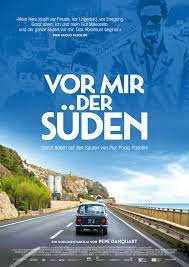![]()
Italy | Germany 2020
Opening July 1, 2021
Directed by: Pepe Danquart
Writing credits: Documentary
Principal actors: Documentary
 In this evocative, elegiac documentary German director Pepe Danquart, with cameraman Thomas Eirich-Schneider, retraces Pier Paolo Pasolini’s 3000-kilometer coastline 1959 journey. On assignment for the magazine Successo, Pasolini drove from Ventimiglia, bordering France in northeast Italy, to Trieste in the northwest. Danquart, also driving a Fiat Millecento during the seven-week odyssey, homage to Pasolini includes archival footage while Voiceover relates notes from Pasolini’s journal.
In this evocative, elegiac documentary German director Pepe Danquart, with cameraman Thomas Eirich-Schneider, retraces Pier Paolo Pasolini’s 3000-kilometer coastline 1959 journey. On assignment for the magazine Successo, Pasolini drove from Ventimiglia, bordering France in northeast Italy, to Trieste in the northwest. Danquart, also driving a Fiat Millecento during the seven-week odyssey, homage to Pasolini includes archival footage while Voiceover relates notes from Pasolini’s journal.
In Genoa, Pasolini is unknown to 51-year-old harbor worker Luca; in Palermo, Sicily, where days start at 05:00, a tailor compares Paris with his peace and quiet now. Enroute fishermen lament their dwindling catches/numbers; Liberian refugees talk about disillusionments; “it’s a passing-through life,” says a sheepherder; Italians complain about tourist-dependency, how “there’s always a crisis but today it’s really bad,” and if work was available the young would stay. Only in a limestone village do elderly, card-playing men enthuse about Pasolini saying, “He was a great film director.” In beautiful Venice, most jarring visually are monstrous cruise ships and masses of disgorged cruisers – “they’re parasites” (the economy needs).
The cleverly intelligent Italian film director Pier Paolo Pasolini’s (1922 – 1975) proliferate credits included journalist, playwright, and novelist with often-controversial political reckonings. Best known abroad through his films, Pasolini depicted picaresque neorealism: Accattone (1961) scrutinizing a pimp’s life; Mamma Roma (1962) about a prostitute (Anna Magnani) and son; Teorema (1968) sexual allegorical study of bourgeois family with Terrance Stamp, and Salò (The 120 Days of Sodom, 1975) sadistic violence based on Marquis de Sade’s eponymous book. His films regularly affronted civic morality standards re sexual behavior, although conversely his unflinching candor had an effect on Italian awareness; Pasolini’s work is still deemed exceedingly contentious.
Danquart’s documentary correlates with Pasolini’s concern for pre-industrial culture’s vanishing, to be replaced by consumptively driven societal demands that often go against nature. Nonetheless, Vor mir der Süden’s meandering length (Andrew Bird edits) about someone many Italians no longer remember (Pasolini was murdered 45-years ago) requires patience. Perhaps a shorter, more consequential road trip could have better captured Pasolini’s legacy. 117 minutes ()
